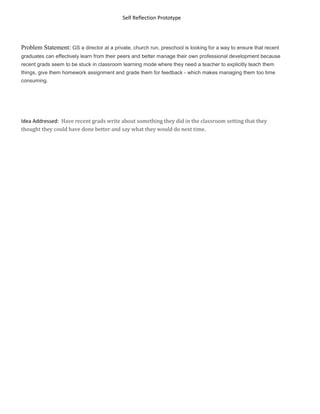
Self reflection prototype
- 1. Self Reflection Prototype Problem Statement: GS a director at a private, church run, preschool is looking for a way to ensure that recent graduates can effectively learn from their peers and better manage their own professional development because recent grads seem to be stuck in classroom learning mode where they need a teacher to explicitly teach them things, give them homework assignment and grade them for feedback - which makes managing them too time consuming. Idea Addressed: Have recent grads write about something they did in the classroom setting that they thought they could have done better and say what they would do next time.
- 2. Four Steps to Reflection Critical reflection allows us to construct rich metacognative understandings and beliefs about student learning and instruction. This is gained through consideration of self identity, classroom environment, student needs and current research in relation to specific situations. Choose an experience that happened at school or in the classroom. You might choose an experience that surprised you, something you are curious about and/or wonder about. The event can be something positive or something that challenged you or was unsettling. Now consider the following questions in relation to the event. You may wish to write these in your PGG and share them aloud with your cooperating teacher or college supervisor. Step 1 – Here’s what! Describe in detail what happened • What did I do? What did others do? • What were my feelings at the time? What were their feelings? • What was going on around us? Was there anything unusual happening? • When did it occur? • Where were we? Step 2 – Why? Awareness of Essential Aspects - Analysis, interpretation • Why do I think things happened in this way? • Why did I act in that way? Why might the others have acted the way they did? What was going • on for each of us? • How might my feelings and/or context have affected my choice of behavior? • Was time or activity a factor? • What were some of the options I considered? • Are there other contributing factors? What was done in the past? Something said to someone? • Knowledge or skill level? • What are my hunches about why things happened the way they did? Step 3 – So what? Overall meaning and application • Why did this seem worth reflecting on? • What might the ideal situation have been? • What might I learn from this? What core quality or skill is needed to overcome limitations? • How might this change my future thinking, behavior, interactions? • What questions remain? Step 4 – Now what? Creating methods of action • Are there other people or resources I should actively include in reflecting on this event? If so, • who and what would we interact about? • How does the research base support my understanding and interpretations? • Next time a situation like this presents itself, what do I want to remember to think about? How • do I want to behave? • What are some specific patterns or trends that seem to be emerging?
- 3. • When I experienced______, what did you need? • Given these details, what is the big picture goal? • How could I set up conditions to increase the likelihood of productive interactions and learning? Source: York-Barr, J.; Sommers, W.; Ghere, G.; & Montie, J. (2001). Reflective practice to improve schools. Thousand Oaks, Calf.: Corwin Press. Adapted from: Richardson, J. (2002). Take a closer look. National Staff Development Council, 2-8. Source: http://www.usask.ca/education/program/fieldexperiences/tools-resources/focus/four-steps- reflection.pdf